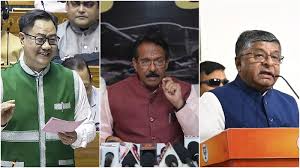New BJP chief likely soon as party appoints senior leaders to oversee organisational polls

New BJP Chief on the Horizon as Party Ramps Up Organisational Elections
With senior leaders taking charge of key states, BJP accelerates internal elections to pave the way for a new party president.
The Bharatiya Janata Party (BJP) is preparing for a major leadership shift. The party has started fast-tracking its internal organisational elections, a move that signals the arrival of a new national president by late July or early August. To support this goal, the BJP recently appointed key leaders to oversee state-level polls in Maharashtra, Uttarakhand, and West Bengal.
Union Minister Kiren Rijiju will supervise the process in Maharashtra. Harsh Malhotra, former Delhi BJP general secretary, will manage Uttarakhand. Senior BJP leader and MP Ravi Shankar Prasad will handle the proceedings in West Bengal. These appointments suggest the party is serious about completing its pending organisational work.
BJP Pushes to Meet Internal Poll Quota
The BJP’s constitution states that over half of its state and union territory units must complete internal elections before selecting a national president. So far, 14 out of 37 units have done so. However, several major states—such as Uttar Pradesh, Gujarat, Telangana, and Karnataka—still need to conduct their elections.
With new appointments in place, the BJP hopes to complete the process soon. The party wants to meet the threshold required to convene the national council, which will elect the next national president.
J.P. Nadda’s Extended Tenure Nears End
J.P. Nadda has led the party since 2020. His original term was extended beyond January 2023 to ensure leadership stability during the 2024 general elections. Now that the elections have concluded and the NDA has returned to power, the BJP must finalize its internal structure.
Multiple party insiders believe the leadership is keen to install a new face ahead of upcoming state elections. Completing internal polls will allow the national leadership to shift focus to voter outreach and campaign planning.
Internal Challenges and State-Level Complexities
Delays in the organisational process stem from more than election focus alone. Internal disputes in some state units have slowed progress. For instance, regional factions in Maharashtra and Karnataka have made it hard to agree on new unit heads.
To address this, the party has deployed neutral senior leaders. By doing so, the BJP aims to ensure fairness and avoid internal conflict. Kiren Rijiju’s appointment in Maharashtra is one such example. His presence may help balance competing power centers within the state.
Who Might Be the Next BJP Chief?
As the national council’s formation nears, the party is also weighing its options for the top post. Several names are being considered for the role.
Union Ministers such as Dharmendra Pradhan, G. Kishan Reddy, and Bhupender Yadav enjoy strong support from both the party and the RSS. Former chief ministers like Shivraj Singh Chouhan and Manohar Lal Khattar also remain in contention. Their administrative experience and broad support within the organisation work in their favor.
Observers believe the final choice could reflect broader strategic goals. For instance, the party may pick someone from the South or East to expand its reach. Alternatively, it may choose a trusted leader from the Hindi belt to reinforce its traditional base.
Coordination With RSS Will Shape the Outcome
Though the BJP will conduct the election, the RSS plays a key role in such major decisions. Any incoming president must enjoy support—or at least acceptance—from the Sangh. A smooth transition also requires consensus among senior party leaders.
The new president must balance two crucial tasks. One involves maintaining ideological alignment with the Sangh. The other is navigating electoral coalitions and keeping regional allies engaged. These tasks become even more important now that the BJP must rely more on allies than in past terms.
Timeline and Next Steps
Once enough states complete their organisational elections, the central leadership will form the electoral college. This group will then elect the next president at a national convention.
Most sources expect this process to conclude between late July and early August. The party is moving fast to avoid delays ahead of major state elections in Bihar, Jharkhand, and Maharashtra.
Conclusion
The BJP has entered a decisive phase in its internal operations. With top leaders overseeing key state elections, the party is inching closer to choosing a new president. This leadership change will shape the BJP’s next political chapter and offer direction before critical state polls.
The upcoming announcement will not just impact the party’s internal structure. It will also signal how the BJP plans to tackle new political challenges and maintain its dominance in a more competitive national landscape.






